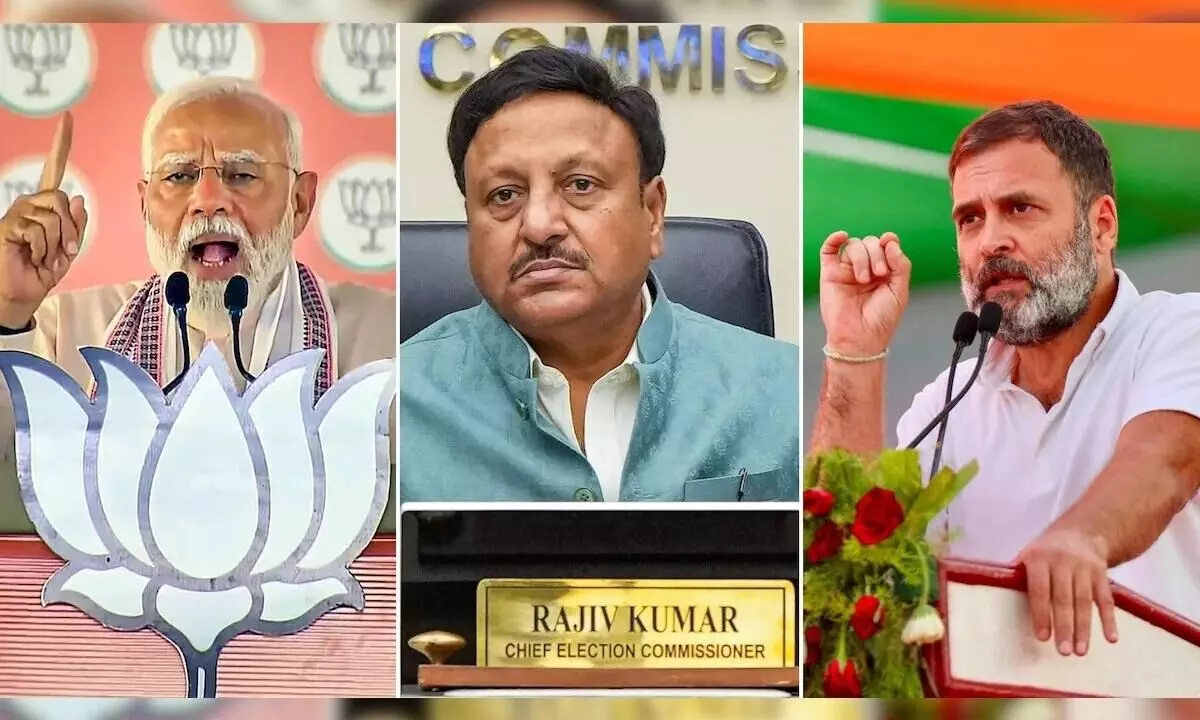
Deliberately avoided action against Modi, Gandhi for MCC violations: EC
text_fieldsIn a recent interview with Scroll, Chief Election Commissioner (CEC) Rajiv Kumar defended the Election Commission's (EC) approach during the general elections, particularly its decision to refrain from taking direct action against Prime Minister Narendra Modi and other top political leaders for alleged code violations.
This stance has sparked significant debate about the impartiality and efficacy of the EC.
During the general election campaign, Prime Minister Modi made remarks in Rajasthan that were perceived as targeting Muslims. He suggested that promises in the Congress’s manifesto would lead to wealth redistribution to “those who produce more children” and “infiltrators,” terms widely understood as references to Muslims.
This speech prompted the Congress to complain to the EC, while the BJP also filed a complaint against Rahul Gandhi for his comments.
However, instead of addressing these complaints directly against Modi and Gandhi, the EC chose to communicate with the presidents of both parties. This decision was criticized as insufficient, as it seemed to absolve the top leaders of direct responsibility.
CEC Kumar explained that the EC had “deliberately decided” not to “touch” the top two leaders of both the BJP and the Congress. Instead, the EC directed the party presidents to ensure that their campaigners adhered to the model code of conduct.
Kumar justified this approach by emphasizing the responsibility of the top leaders in a vast nation like India. He suggested that by reminding the party presidents of their duties, the EC hoped to influence the behaviour of other party members indirectly.
According to Kumar, this strategy resulted in compliance from approximately 80% of the second-tier leadership, although some prominent leaders, such as Assam Chief Minister Himanta Biswa Sarma, continued to make controversial remarks.
Kumar also highlighted the judiciary’s role in this context. He referred to the Delhi High Court and the Supreme Court's decisions not to entertain petitions seeking Modi’s disqualification over alleged model code violations. Both courts emphasized that the responsibility to take action lay with the EC. The high court indicated that the EC must form its independent view, while the Supreme Court noted that petitioners should first approach the EC.
Despite these judicial pronouncements, Kumar’s remarks indicate the EC's reluctance to confront top leaders directly, opting instead to hold party presidents accountable. He argued that this approach was balanced, noting that the EC had also refrained from addressing equally serious issues from the opposition.
Kumar underscored the importance of leadership responsibility, suggesting that top leaders need to recognize their roles in maintaining the decorum of electoral campaigns. He stressed that the EC’s strategy aimed to foster a sense of responsibility among senior political figures, rather than issuing direct reprimands.
This stance has prompted mixed reactions. Critics argue that the EC’s reluctance to take decisive action against top leaders undermines its credibility and effectiveness. Supporters, however, might view this approach as a pragmatic way to manage the complexities of India’s political landscape, where confrontation with top leaders could lead to greater controversy and resistance.























